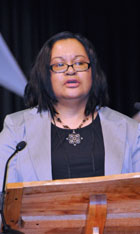The transformational power of the initiative that empowers African-American churches with a renewed sense of ministry was approved by the delegates to the 2008 General Conference.
The 12-year-old initiative, known as Strengthening the Black Church for the 21st Century (SBC-21), has helped hundreds of struggling black churches connect with successful ones to gain insights and encouragement for their ministries.
The General Conference delegates, in a vote of 739 to 15, approved the initiative that is "taking revitalization from the pew to the pavement," said the Rev. Dorothy Watson Tatem, a member of the project's coordinating committee and delegate from the Eastern Pennsylvania Annual (regional) Conference.
Delegates approved a budget of $2 million for 2009-2012, which will not become final until a total budget is presented by the denomination's Council of Finance and Administration and approved by the 2008 General Conference.
There are more than 2,400 African-American churches and 432,354 African Americans in The United Methodist Church in the United States. Strengthening the Black Church for the 21st Century "is empowered by the resurrected Christ, challenging the belief that The United Methodist Church is dying," said Michigan Area Bishop Jonathan Keaton, chairperson of the initiative.

Cheryl Stevenson describes the linking of congregational resource centers with struggling black churches.
According to Cheryl Stevenson, the initiative's executive director, 30 congregational resource centers have developed more than 100 learning units that share training tools for African-American churches in rural, urban and suburban areas across the five U.S. jurisdictions. These centers covenant to open themselves up as partner churches to provide training, resources and models for church development.
Delegates were introduced to resources and churches that have increased their effectiveness, mission and ministry through participating in SBC-21 and to the newly released publication God Delivers Me, which celebrates churches impacted by the initiative. They learned of the Children's Academy of Life Transformation Inc., a ministry of Memorial United Methodist Church, High Point, N.C., formed as the church used a model of rural ministry it learned from the St. Thomas Charge in Huger, S.C.
"The bridging of the past and the future is the meaning of transformation," said Carolyn Johnson, the initiative's vice chairperson and a General Conference delegate from the North Indiana Conference.
As the initiative moves forward, transformation will be its theme and its task as it fosters trainings in worship, faithful outreach and planning, administration, support, nurture and empowerment for as many churches as possible. "It is not limited to an African-American population but is to be a gift to the entire denomination," Johnson said.
Strengthening the Black Church wants to enhance the relationships of African-American churches with the denomination's central conferences-which lie outside of the United States-and congregations of African descent in Latin America, the Caribbean and North America, as well as enhance youth and young adult ministries and enter partnerships to develop new faith communities.
The initiative will explore the strengthening of relationships throughout the entire African Diaspora and continue to offer hope, Johnson said. She describes the initiative in the next four years as being about "making the connection and understandings about what it means to be African (and) to be African American and what are the commonalities.
"The residency of hope is not marked by a mailing address, a mailbox or ZIP code. It is located in the belief, the theology and practice that Christ is indeed our center of hope, healing and wholeness."
*Green is a United Methodist News Service news writer based in Nashville, Tenn.
News media contact: Linda Green, e-mail: [email protected].
Phone calls can be made to the General Conference Newsroom in Fort Worth, Texas, at (817) 698-4405 (817) 698-4405 until May 3. Afterward, call United Methodist News Service in Nashville, Tenn., at (615) 742-5470
(817) 698-4405 until May 3. Afterward, call United Methodist News Service in Nashville, Tenn., at (615) 742-5470 (615) 742-5470.
(615) 742-5470.
Related Articles
General Conference headlines
Church's black caucus observes 40th anniversary
September gathering will focus on black church vitality
Resource
Like what you're reading? Support the ministry of UM News! Your support ensures the latest denominational news, dynamic stories and informative articles will continue to connect our global community. Make a tax-deductible donation at ResourceUMC.org/GiveUMCom.




